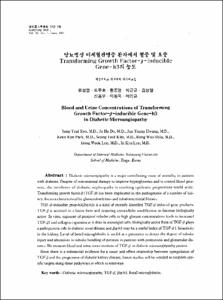당뇨병성 미세혈관병증 환자에서 혈중 및 요중 Transforming Groeth Factor-β inducible Gene-h3의 농도
- Keimyung Author(s)
- Ryu, Seong Yeol; Do, Ju Ho; Park, Keun Gyu; Lee, In Kyu
- Department
- Dept. of Internal Medicine (내과학)
- Journal Title
- Keimyung Medical Journal
- Issued Date
- 2001
- Volume
- 20
- Issue
- 1
- Abstract
- Diabetic microangiopathy is a
major contributing cause of mortality in patients with diabetes. Despite of conventional therapy to improve hyperglycemia and to control blood pressure, the incidence of diabetic nephropathy is reaching epidemic proportions world wide. Transforming growth factor- β (TGF-β) has been implicated in the pathogenesis of a number of kid¬ney diseases characterized by glomerulosclerosis and tubulointerstitial fibrosis.
TGF-β-inducible gene-h3(βig-h3) is a kind of recently identifed TGF- β induced gene products. TGF- β is secreted in a latent form and requiring extracellular modification to become biologically active. In vitro, exposure of proximal tubular cells to high glucose concentrations leads to increased TGF- β1 and collagen expansion as it does in mesangial cells. Biologically active form of TGF- β plays a pathogenetic role in diabetic renal disease and βig-h3 may be a useful index of TGF- β1 bioactivity in the kidney. Level of beta2-microglobulin is useful as a parameter to detect the degree of tubular injury and alterations in tubular handling of proteins in patients with proteinuria and glomerular dis¬eases. We measure blood and urine concentrations of TGF- β in diabetic microangiopathy patient.
Since there is a substantial evidence for a cause and effect relationship between upregulation of TGF- β and the progression of diabetic kidney disease, future studies will be needed to establish spe¬cific targets along these pathyways at which to intervene.
- Alternative Title
- Blood and Urine
Concentrations of Transforming Growth Factor-β-inducible Gene-h3 in Diabetic Microangiopathy
- Publisher
- Keimyung University School of Medicine
- Citation
- 류성열 et al. (2001). 당뇨병성 미세혈관병증 환자에서 혈중 및 요중 Transforming Groeth Factor-β inducible Gene-h3의 농도. Keimyung Medical Journal, 20(1), 55–61.
- Type
- Article
- Appears in Collections:
- 2. Keimyung Medical Journal (계명의대 학술지) > 2001
1. School of Medicine (의과대학) > Dept. of Internal Medicine (내과학)
Items in Repository are protected by copyright, with all rights reserved, unless otherwise indicated.
